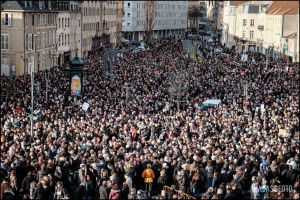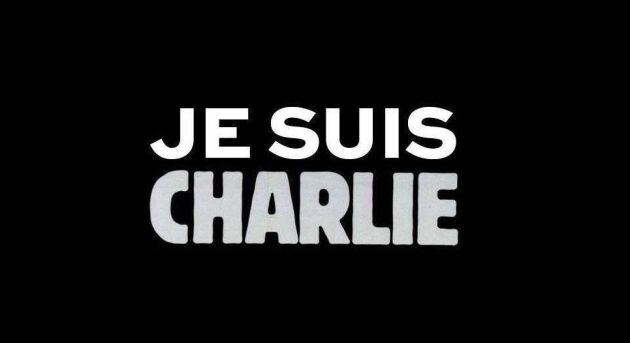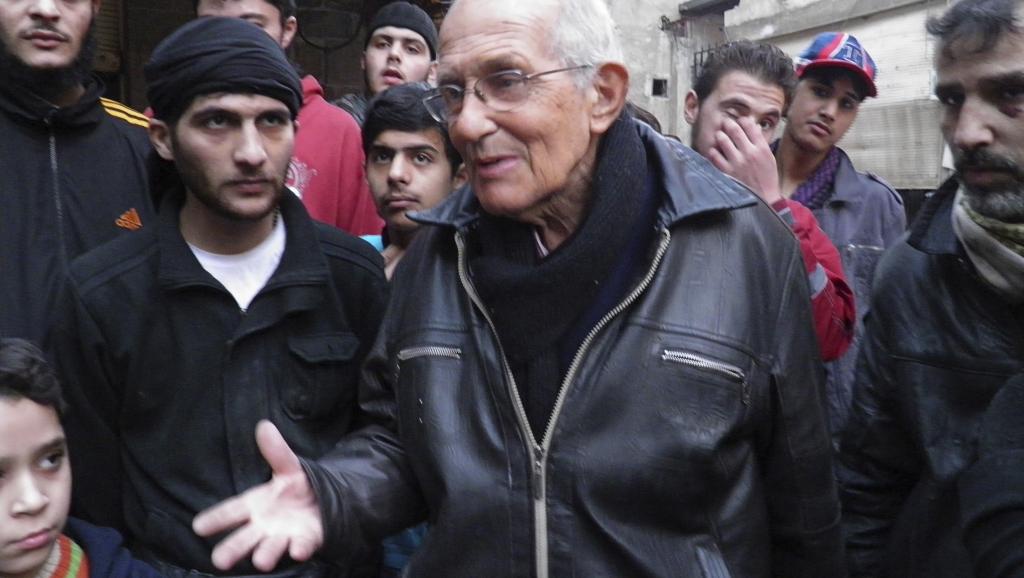
Auteur: nadassfoto « Je suis Charlie », manifestation suite au massacre de la rédaction du journal Charlie Hebdo » (CC BY-NC-SA 2.0)
Is Charlie Hebdo attack new to social phenomena? What are the reasons behind Islamic terrorism? Is freedom of speech a western value? This article attempts to handle these tough questions by giving way to thinking outside the box into which mobilizers are forcefully pushing us.
What shocked me in Paris terror attacks was different from what afflicted a large part of the Occident. Even though much of what I experienced in my life as a free writer would make me identify with humanists and free artists in general, I see in social identification a great part of the problem.
I was stunned by the speed western society mobilized after the 7th of January attacks. This difference in attitudes is due to the fact that I had my secular upbringing in a widely religious society, and I learnt how to deliver, pass and code my messages and my divergent views in an environment that does not acknowledge individuality, human rights, and the freedom of expression. In contrast, Europeans and Americans, generally, think of human rights and freedom of speech as part of their cultural heritage rather than universal values, and tend to think of terrorism as rooted in another culture or other cultures. However, by thinking like that, they are likely to marginalize and exclude a considerable percentage of western citizens who come from oriental origins whether well integrated or not.
I wonder why all those muslims in France feel the need to defend themselves against putative accusation of terrorism as the French law does not convict people of terrorism unless they are complicit in it. In other words, if I were a French Muslim and I trusted the rule of law in France, why would I feel threatened if five million French Muslims turned to be terrorists?

Auteur: Bernard Blanc « Pau est Charlie, Béarn, Pyrénées Atlantiques, Aquitaine, France » (CC BY-NC-SA 2.0)
I wonder also why a parallel mobilization is taking place in the USA where more extremist reactions are coming out. Paris attacks are being excessively exploited by Obama’s opponents to denounce his policy regarding the Middle East and the Muslim world in general. Moreover, the talk about pausing Muslim immigration is witnessing a renewal. Such reaction is excessive when we realize that France has proportionately a much larger Muslim population than North America. I wonder also why a terrorist attack conducted by a small number of people triggers off such controversy in the American medias about a menacing third world war unless there is a desire to declare it. If we exclude the notion that this kind of mobilization is part of the preparations for this war (which is the worst possible scenario) and tend to think that occidentals are responding to the threat by highlighting a principal emblem of their culture (freedom of expression), then it is also not the best thing to do.

Auteur: Quentin Chandelier « Je suis Charlie » (CC BY-NC-SA 2.0)
Occidentals should be very careful with matters of identity and should not overuse the slogan « I am Charlie » for the risk of becoming an alienating slogan as well as paving the way for a rivaling slogan « I am not Charlie » as long as they actually care about stability in and out of the Western world. I would like to bring the attention to the frustration Muslims might feel as a result of finding themselves constantly stigmatized as perpetrators of terrorism. Moreover, the reluctance or the failure at integrating Muslims is liable to lead the frustrated ones to succumb to the call of terrorists. Personally, I think of Islamic terrorism as a natural aggregate result of the failure of integration programs in the west, and the obvious unwillingness of the global powers to make peace in the Middle East.
I would like to direct the attention of those who are involved in the movement of mobilization that stressing certain values is actually a symptom of an imminent crisis because all the human values are consequently reduced to one highlighted value − in this case it is « freedom of expression ». Hitler relied heavily on two values (dignity and pride) to mobilize Germans. Likewise, Islamic terrorists prioritize the value of « martyrdom » to mobilize their recruits. Needless to mention also that to create a crisis is much easier than to solve it. Social identification is a capacity of our minds and a method to defend our identity against the outside world, but also a risky rejection and by extension, knowledge of the « other ». In fact, a Muslim who identifies with his prophet Mohammed is going through the same mental process by which a professor identifies with his/her titles and certificates and gets mad because a student addresses him/her without this title. Both Mohammed and the title work as sources of values. An original problem arises when this Muslim or that professor has no other sources of values to safeguard his/her self-image, and the second problem comes when individuals or the society shakes their self image constantly and pushes them to eliminate the sources of their trouble by murdering or rejecting their « offenders ». I do not pretend that I know all the details or the motives for the Charlie Hebdo massacre, but what I am sure about is that it is not new to social phenomena and if we broaden the scope of our social identification, we will find out that it is not more horrific than what is taking place all over the world.

Auteur: Franck Mée « Hommage » (CC BY-NC-SA 2.0)
I think it is not reasonable to say that all of France or the western world has been attacked, and those who do so, are actually using the same logic that Islamists use when they say that Islam has been attacked. Really, by adopting this exaggeration for either assessing threats or evading them, occidentals give a justification for Islamists who would have more reason to talk about anti-Muslim attacks after all that chaos in the Muslim world and the overt intervention of different western powers.
If occidentals care about stability and freedom of expression inside their borders they have to work for stability, democracy and human rights outside their borders. By doing so, they would help Muslims and others criticize their own values, broaden their vision of their humanity and bolster their intolerance. By doing the opposite along with an insistent association between Islam and terrorism, they just push them towards radicalism.
Ibrahim Rami
Membre de la rédaction Neuchâteloise de Voix d’Exils
« Je suis Charlie » : arrêtez la mobilisation !
Est-ce que l’attaque contre Charlie Hebdo est un nouveau phénomène social? Quelles sont les raisons qui animent le terrorisme Islamique? Est-ce que la liberté d’expression est une valeur occidentale? Cet article tente de traiter ces questions difficiles en proposant un point de vue qui sort du carcan dans lequel les protestataires du mouvement «Je suis Charlie» nous enferment forcément.
Ce qui m’a choqué dans les attaques terroristes à Paris était différent de ce qui a affligé à une grande partie de l’Occident. Même si une grande partie de ce que j’ai vécu dans ma vie en tant qu’écrivain libre me conduirait à m’identifier aux humanistes et artistes libres, en général, je vois dans l’identification sociale une grande partie du problème de cette mobilisation.
J’ai été stupéfait par la vitesse avec laquelle la société occidentale s’est mobilisée suite aux attaques de janvier 2015 à Paris. Cette différence d’attitude est due au fait que j’ai une éducation laïque dans une société largement religieuse et j’ai appris comment livrer, passer et coder mes messages et mes points de vue divergents dans un environnement qui ne reconnaît pas l’individualité, les droits de l’homme, et la liberté d’expression.
En revanche, les européens et les américains, en général, considèrent les droits de l’homme et la liberté d’expression comme étant l’héritage de leur patrimoine culturel plutôt que des valeurs universelles et tendent à penser que le terrorisme est enraciné dans une autre culture ou d’autres cultures. Toutefois, en pensant de la sorte, ils sont susceptibles de marginaliser et d’exclure une partie considérable des citoyens occidentaux qui sont d’origine orientale, bien intégrés ou non.
Je me demande aussi pourquoi tous ces musulmans en France sentent la nécessité de se défendre contre l’accusation présumée de terrorisme, étant donné que la loi française ne reconnaît pas les gens comme terroristes, à moins d’y être directement impliqué. En d’autres termes, si j’étais un musulman français et que je faisais confiance à la primauté du droit en France, pourquoi devrais-je me sentir menacé si cinq millions de musulmans français se sont tournés vers les terroristes ?
Je me demande aussi pourquoi une mobilisation parallèle se déroule aux États-Unis, où davantage de réactions extrémistes se manifestent. Les attentats de Paris sont excessivement exploités par les adversaires d’Obama pour dénoncer sa politique au Moyen-Orient et dans le monde musulman en général.
En outre, le discours sur la suspension de l’immigration musulmane témoigne d’un renouveau. Cette réaction est excessive, lorsque nous nous rendons compte que la France a une population musulmane proportionnellement beaucoup plus grande que l’Amérique du Nord. Je me demande aussi pourquoi une attaque terroriste menée par un petit nombre de personnes déclenche une telle controverse dans les médias américains qui parlent d’une troisième guerre mondiale menaçante si ce n’est un désir de la déclarer.
Si l’on exclut l’idée d’une telle mobilisation en guise de préparatifs pour cette guerre (ce qui serait le pire scénario possible) et tendons plutôt à penser que les occidentaux font face à la menace en mettant en évidence l’emblème principal de leur culture (liberté d’expression) alors ce n’est également pas la meilleure chose à faire….
Les occidentaux devraient être très prudents avec les questions d’identité et ne doivent pas abuser du slogan «je suis Charlie» qui risque de devenir un slogan aliénant ouvrant la voie à un slogan rivalisant «je ne suis pas Charlie». Ce, bien entendu, pour autant qu’ils se préoccupent vraiment de la stabilité à l’intérieur et en dehors du monde occidental.
Je voudrais aussi attirer l’attention sur la frustration des musulmans qui pourraient se sentir par la suite en étant constamment stigmatisés comme auteurs potentiels d’actes terroristes. Personnellement, je pense que le terrorisme islamique est le résultat naturel de l’échec des programmes d’intégration dans l’Ouest, de la réticence évidente des grandes puissances mondiales à faire la paix aux Moyen-Orient et de la réticence ou l’incapacité à intégrer les musulmans, ce qui est susceptible d’amener les frustrés à succomber à l’appel des terroristes.
Discutons à présent des personnes qui sont impliquées dans le mouvement de mobilisation «Stop Charlie» et qui, en soulignant certaines valeurs, en font le symptôme d’une crise imminente où toutes les valeurs humaines sont réduites à une valeur mise en évidence. Dans ce cas: « la liberté d’expression ». Hitler s’était fortement appuyé sur deux valeurs : la dignité et la fierté pour mobiliser les Allemands… De même, les terroristes islamiques mettent la priorité sur la valeur de « martyrs » pour mobiliser leurs recrues. Inutile de mentionner également que créer une crise est beaucoup plus facile que de la résoudre…
L’identification sociale est une capacité de notre esprit et une méthode pour défendre notre identité contre le monde extérieur, mais aussi, par extension, un rejet risqué de la connaissance de « l’autre ».
En fait, un musulman qui s’identifie à son prophète Mahomed passe par le même processus mental que par lequel un professeur s’identifie avec ses titres et se met en colère parce qu’un élève l’aborde sans faire appel à ses titres. Comme le titre de professeur, le prophète Mohamed est une source de valeurs. Un problème initial se pose lorsque ce musulman ou ce professeur n’a pas d’autres sources de valeurs pour sauvegarder son image et le second problème vient quand les individus ou la société bouscule leur image en permanence en les poussant à éliminer les sources de leur détresse en assassinant ou rejetant leurs « délinquants ».
Je ne prétends pas connaître tous les détails ou les motifs du massacre de Charlie Hebdo, mais ce dont je suis sûr, c’est que ce n’est pas nouveau en tant que phénomène social et que si nous élargissons la portée de notre identification sociale, nous allons découvrir qu’elle n’est pas plus horrible que ce qui se passe partout ailleurs dans le monde.
Je pense que ce n’est pas raisonnable de dire que toute la France ou le monde occidental a été attaqué, et ceux qui le font effectivement utilisent la même logique que les islamistes quand ils disent que l’islam à été attaqué.
Vraiment, en adoptant cette exagération soit pour évaluer les menaces ou les élucider, les occidentaux donnent une justification pour les islamistes qui auraient plus de raisons de parler d’attaques anti-musulmanes après tout le chaos dans le monde musulman généré par l’intervention manifeste de plusieurs puissances occidentales dans cette région…
Si les occidentaux se soucient réellement de la stabilité et de la liberté d’expression à l’intérieur de leurs frontières, ils doivent aussi travailler pour la stabilité, le respect de la démocratie et des droits humains en dehors de leurs frontières.
En faisant de la sorte ils aideraient les musulmans et tous ceux qui critiquent leurs valeurs à élargir leur vision de l’humanité et à renforcer leur tolérance. En faisant le contraire et en associant de manière insistante l’islam au terrorisme, ils ne font que pousser les musulmans vers le radicalisme.
Ibrahim Rami
Membre de la rédaction neuchâteloise de Voix d’Exils




